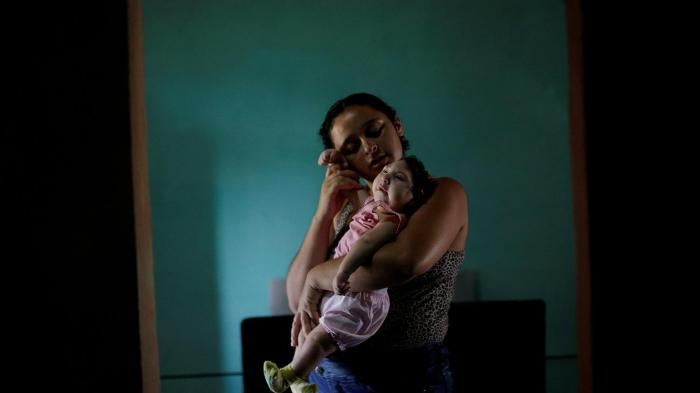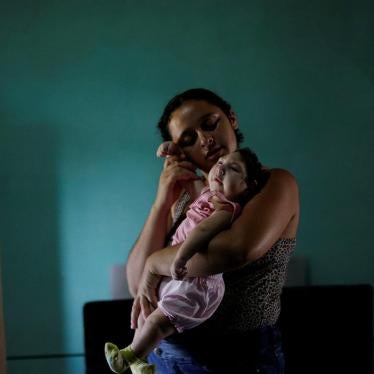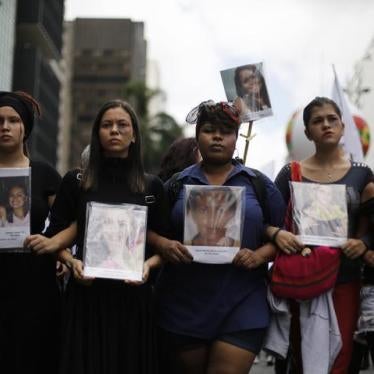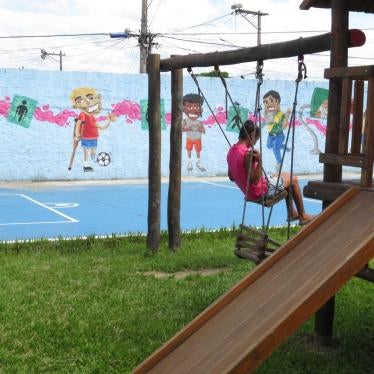Clara is a community health worker’s dream client—she has absorbed all the training offered on preventing mosquito breeding in her home and implements it to perfection. I spoke to her last October in a favela in downtown Recife. She described how she diligently washes and covers her stored water tanks and told me that environmental officers even recognized her great efforts. “Congratulations,” they told her during the last inspection.
But, Clara is frustrated. Her efforts to keep things clean at home seem futile when she looks at what’s happening outside her front door. “I have a flush toilet in the house, and it goes directly into the river. We don’t have any standing water here in the house, but the river is directly behind us.”
The marshy area behind her house is a breeding ground for mosquitos.
For the past 10 months, we have been researching the impact of the Zika epidemic on women, girls, and families in northeastern Brazil. We interviewed 183 people, including 98 women and girls, for a new Human Rights Watch report.
The outbreak in Brazil exposed longstanding human rights problems that in turn exacerbated its impact. The Zika virus is most often transmitted through the bite of an infected Aedes aegypti mosquito. The warm, humid climate of northeast Brazil, with climate change in the backdrop, is a place where the mosquito thrives. By late 2015 and early 2016, authorities had linked babies born with microcephaly to an outbreak of the virus.
Brazilian authorities faced a reckoning. Decades of underinvestment in public water and wastewater services in this poorest region of the country exacerbated the proliferation of this mosquito. Efforts to control its breeding at the household level—a responsibility that often fell to women and girls—were burdensome and very insufficient.
As the virus raged, women and girls struggled to avoid unplanned pregnancies. Once pregnant, many didn’t get adequate information on how to prevent Zika transmission during pregnancy—causing anxiety and stress.
Criminal penalties for abortion force women and girls who wish to terminate a pregnancy to turn to clandestine, and often unsafe, procedures. Some doctors told us about patients who had used caustic acid or other unsafe methods in the last year to try to induce abortion.
Pregnant women and girls we talked to were scared about contracting Zika. Many, especially from poor communities, said that they couldn’t always afford to use mosquito repellent. And, it’s women from poor communities who typically endure the worst water and wastewater systems and are therefore exposed to more mosquitoes.
Inevitably, then, it’s some of Brazil’s poorest families who are struggling to raise children with Zika syndrome without the support they need. One father told us he had to spend almost his entire monthly salary on medications for his child. Many mothers we spoke with needed to give up their jobs so they could ensure their children had access to services and care—traveling long distances, sometimes daily, to health facilities.
Brazilian health authorities recently declared the Zika emergency over. But for these communities suffering from inadequate water and sanitation infrastructure, the public health crisis remains.
When governments neglect peoples’ rights—to water, to sanitation, and to health—Zika and other diseases thrive.
The end of an emergency is not a time to relax. Now comes the hard work of preventing the next one.
This article was written by Amanda Klasing, Senior Researcher at Human Rights Watch, and João Bieber, consultant at Human Rights Watch










